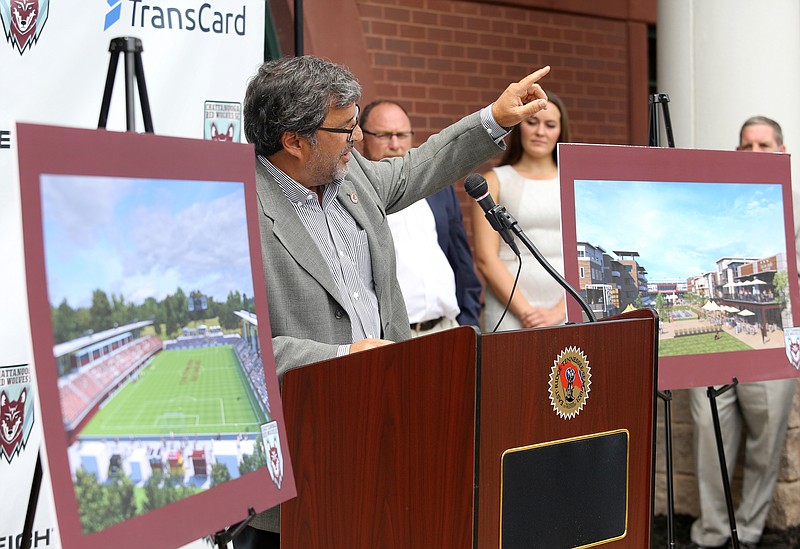Soccer, it was said in the 1970s, was the fastest growing sport in the United States.
Every time that was said, snickers could be heard from denizens of the baseball diamond, football field and basketball court.
Soccer? That will never catch on here.
But when plans for a $125 million development around a soccer stadium are announced, as Chattanooga Red Wolves owner Bob Martino did Thursday, no one is laughing.
Soccer is not only a popular youth sport, but the city now has two professional soccer teams.
Thursday's announcement laid out plans for the new home of the Red Wolves. But it involved more than a 5,500-seat, $6 million stadium for the United Soccer League squad. No, the 100-acre build-out Martino has in mind will involve 400 apartments and condominiums, a 375-room hotel/convention center, restaurants, retail space and even a wooded walking trail.
It will be, the owner said, "a walkable village," "a vibrant community," "a community in which you can work and play."
If Chattanoogans have been to The Battery Atlanta, the village that surrounds the Atlanta Braves' SunTrust Park in Cobb County, Georgia, they will understand the concept Martino has in mind.
The development will be tucked into land in both East Ridge and Chattanooga city limits that area residents pass frequently and probably wonder why nothing, in the nearly 60 years since the interstate highways were built, ever has been built there. If motorists travel the exit lane from I-24 east to I-75 south and look immediately to their right, that's the area where the development - currently owned by Luken Holdings and Fletcher Bright Co. - will be.
Its visibility from I-75 (passed daily by some 144,000 cars), its access from the interstate, its central location and its expected eventual tie-in to Camp Jordan were reasons Martino said it is the ideal spot.
Through the years in Chattanooga, as in any other city, apartments, shopping centers and tourist attractions have been planned and trumpeted to the public but never built. Perhaps the economy slows, investors pull out or the site proves inadequate.
But Martino's plan to build the complex with his investors, and not with public money, lends credence to the idea it will come to fruition. However, he does plan to see a return on his investment, in part, from the 2011 Border Region Retail Tourism Development District Act, which allows cities bordering other states with interstate highways running through them to capture 75 percent of the sales tax collected in the district over a certain period.
If it were possible to do so, the new owner already would have the development underway, but he said the speed at which it gets built will depend on "permitting" and "prep work" and rezoning that must take place before any construction starts. Part of the area is in a floodway with nearby Chickamauga Creek, and part of it in a 100-year flood zone, so a portion of the prep work will be raising some of the acreage.
To be sure, in an area so close to a creek, the Tennessee Department of Environment and Conservation also rightfully will throw in its two cents worth.
If permitting and prep work move along apace, Martino, a Park City, Utah, developer, believes it's conceivable to have the stadium finished for the 2020 season. The hotel and some of the other mixed-use portions of the development would follow closely. Either way, he said, the entire build-out is a three to five-year project.
He envisions not a seasonal but a year-round venue, where people come to shop, eat and gather even when there's no soccer. With the interstate visibility, he also imagines it to be not just a local and regional attraction but one for the eastern United States.
The local soccer community already appreciates the club's support of recreational teams and is likely to be even more gratified for its future plans that include academies and training that help individual players move from the rudiments of the sport to college and then to pro.
The sport, in Chattanooga and in the country, has come a long way from the days when it was snickered about. Indeed, it's come a long way from a decade ago, when Martino said he doesn't believe the area would support two professional soccer teams.
Now, he said, "the region can support all it's currently supporting. Soccer is a sport that draws the cultures together."
Martino's dream, one we hope he can make a reality, will attract not just devoted soccer fans but can create an actual livable, walkable community. And it has an opportunity to have healthy economic impact (1,200 jobs, $7 million tax revenue) on the cities of East Ridge and Chattanooga, and the county, to boot.
